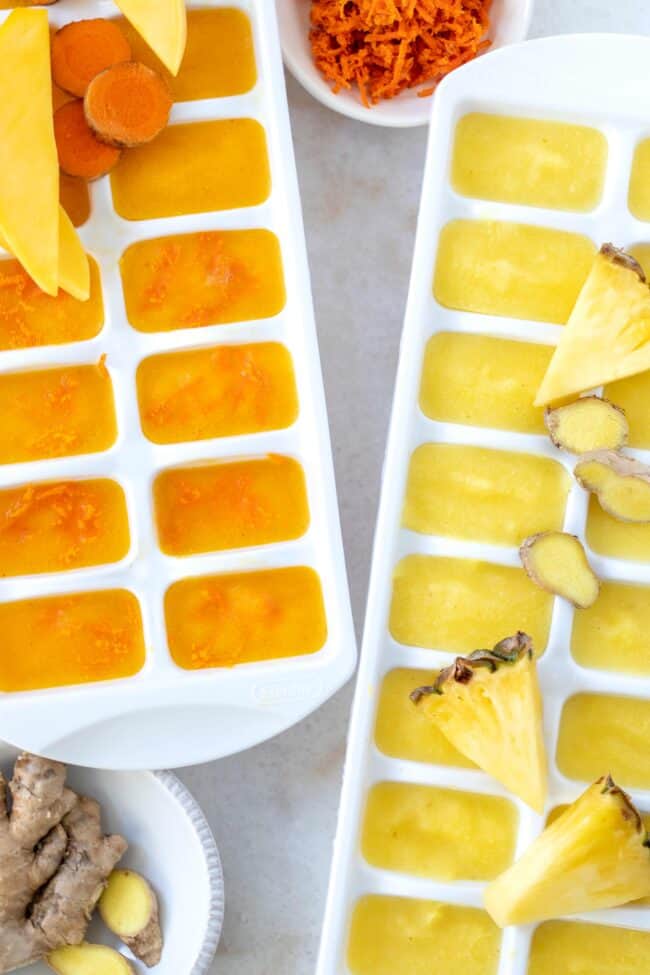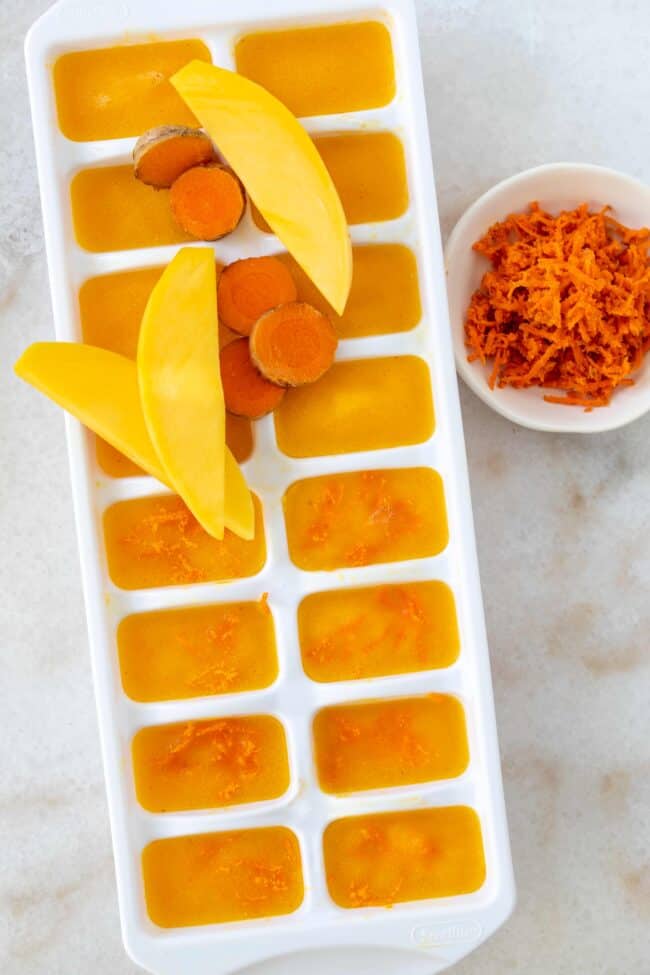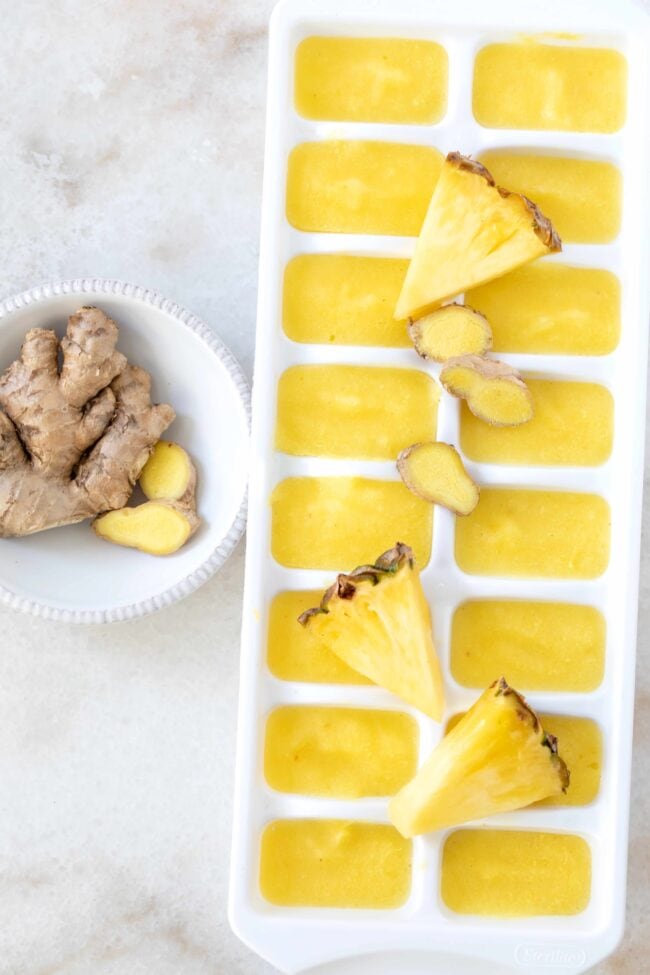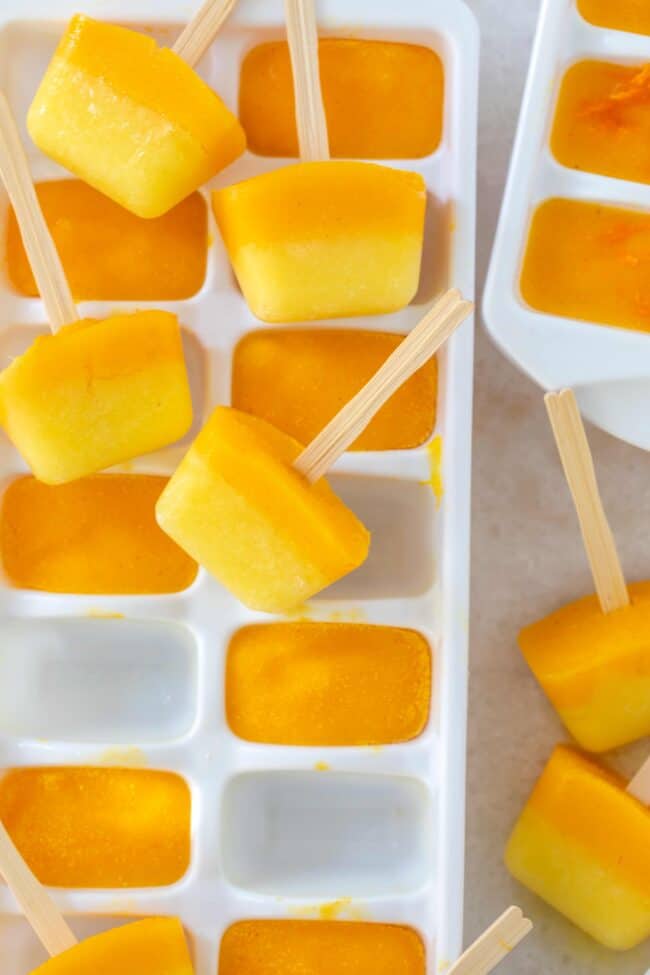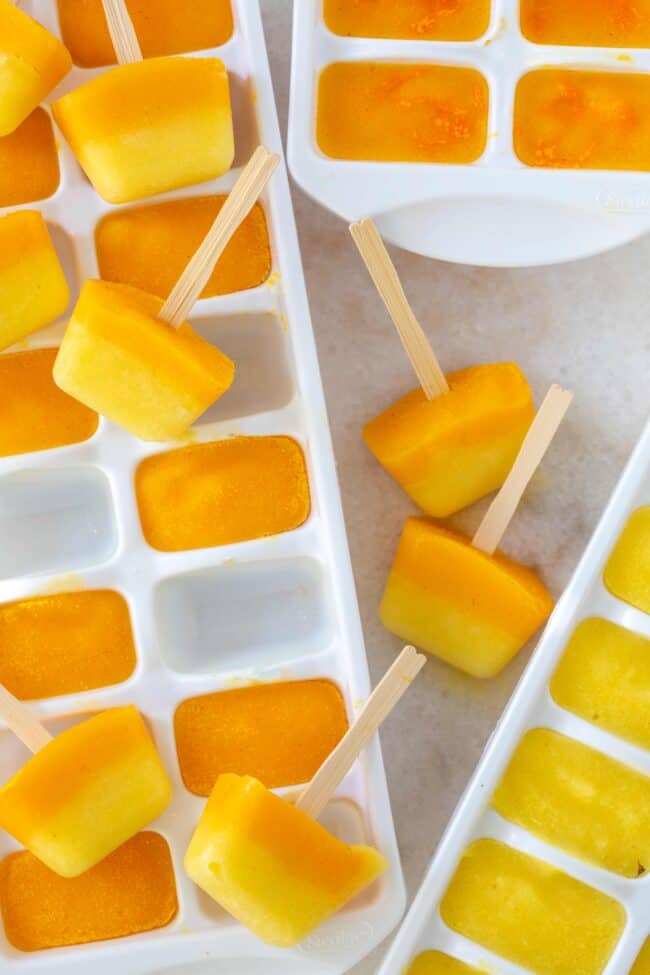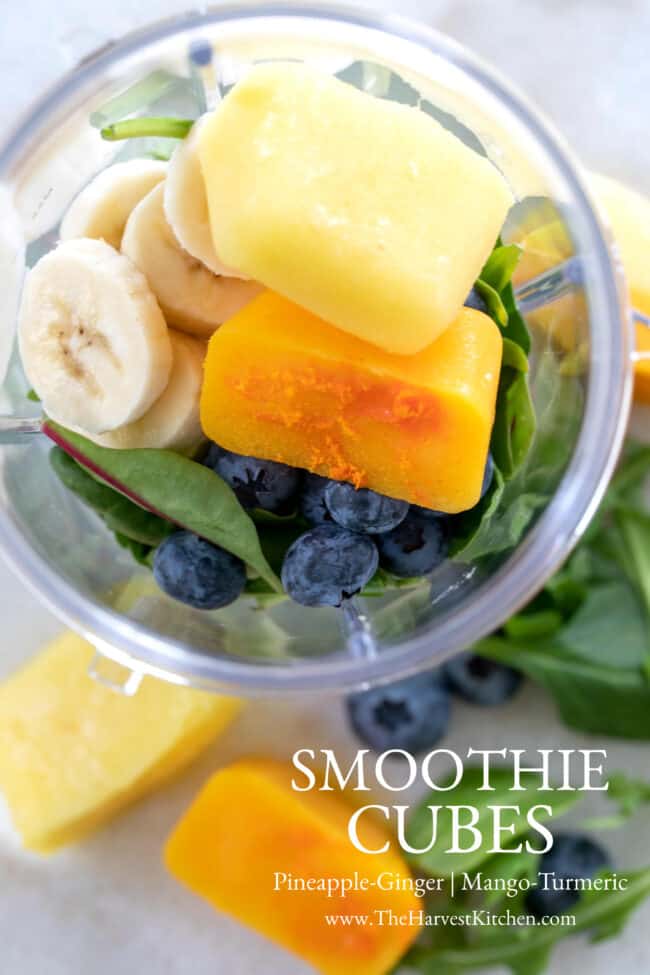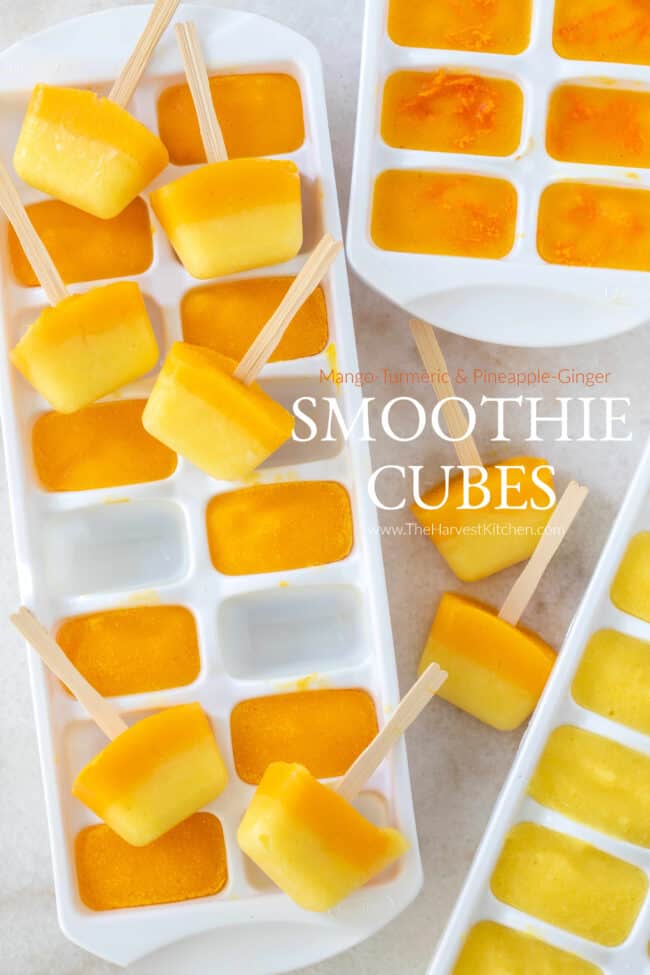Smoothie Cubes
This frozen Smoothie Cubes recipe is made with pineapple, mango, turmeric and ginger, and they add a delicious pop of flavor and nutritional goodness to your morning smoothies!
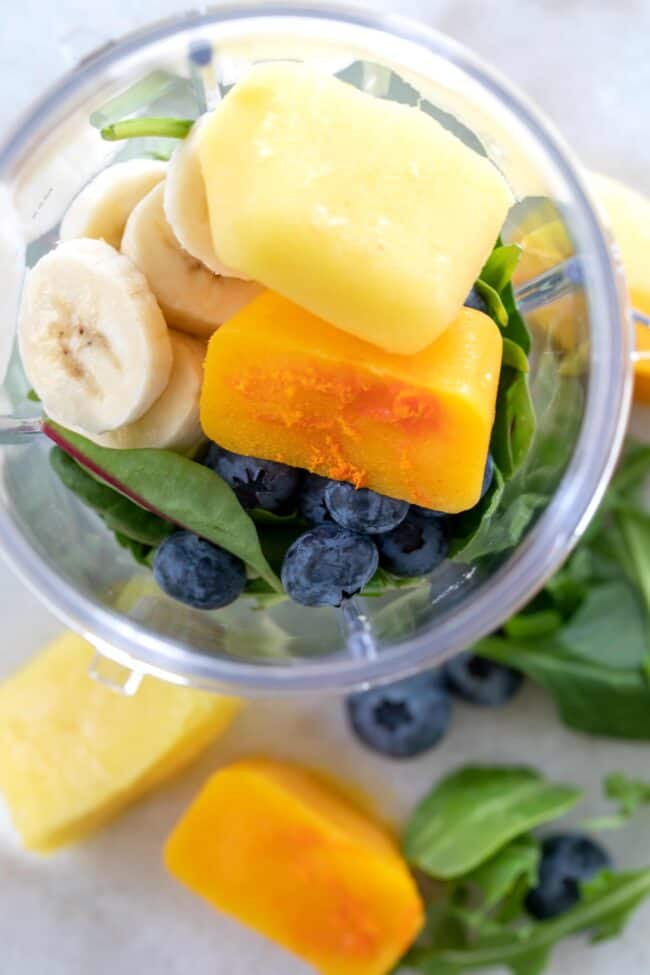
Add these frozen smoothie cubes mango to your morning smoothies, water, tea, or simply snack on them. They are so good!
Smoothie Cubes Recipe
These Pineapple Smoothie Cubes and Mango Smoothie Cubes are so easy to make. You only need 5 ingredients!
Pineapple Ginger
- Fresh organic pineapple
- Ginger root (fresh)
Mango Turmeric
- Fresh organic mango (frozen mango works as well)
- Turmeric (fresh)
- Black pepper
Find printable recipe with the measurements below.
How to Make Smoothie Cubes
Pineapple Ginger
- Peel and finely grate fresh ginger.
- Peel and chop pineapple.
- Add the chopped pineapple and grated ginger to a high powered blender and blend until pureed.
- Using a spoon, fill an ice cube tray with the fruit puree and place in the freezer for 4-6 hour or until frozen solid.
Mango Turmeric
- Peel and finely grate fresh turmeric.
- Peel and chop mango. You can also use frozen mango.
- Add the chopped mango, grated turmeric and black pepper to a high powered blender and blend until pureed.
- You may need to add 1/4 -1/2 cup water to puree the mango.
- Using a spoon, fill an ice cube tray with the fruit puree and place in the freezer for 4-6 hour or until frozen solid.
Variations
- Of course if you want, you can blend all of the ingredients (pineapple, ginger, mango, turmeric and black pepper) together, rather than keeping the pineapple ginger and mango turmeric separate.
Not only are these Smoothie Cubes great to add to smoothies, they also add an awesome pop of flavor to plain water. I also like to make little snack popsicles out of them.
More Flavored Ice Cubes
- Mango Nectar Juice Cubes
- Immune Boosting Whole Lemon Ice Cubes
- Hydrating Lemon Cucumber Ice Cubes
- Cold Fighting Citrus Ice Cubes
- Anti Inflammatory Ginger Ice Cubes
- Summer Berry Ice Cubes
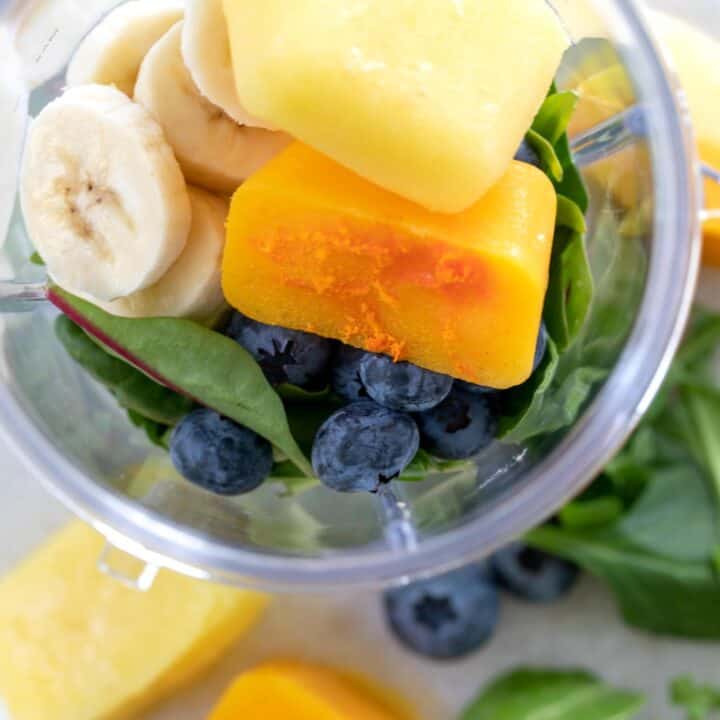
Smoothie Cubes
This Smoothie Cubes recipe is made with pineapple, mango, turmeric and ginger, and they add a delicious pop of flavor to your morning smoothies!
Ingredients
- 3 cups fresh or frozen mango
- 1 tablespoon fresh turmeric, peeled and finely grated
- 1/8 teaspoon black pepper
- 1/4-1/2 cup water to help blend
- 3 cups fresh pineapple
- 1 tablespoon fresh ginger root, peeled and finely grated
Instructions
Pineapple Ginger Smoothie Cubes
- Peel and finely grate fresh ginger.
- Peel and chop pineapple.
- Add the chopped pineapple and grated ginger to a high powered blender and blend until pureed.
- Using a spoon, fill an ice cube tray with the fruit puree and place in the freezer for 4-6 hour or until frozen solid.
Mango Turmeric Smoothie Cubes
- Peel and finely grate fresh turmeric.
- Peel and chop mango. You can also use frozen mango.
- Add the chopped mango, grated turmeric and black pepper to a high powered blender and blend until pureed.
- You may need to add 1/4 -1/2 cup water to puree the mango.
- Using a spoon, fill an ice cube tray with the fruit puree and place in the freezer for 4-6 hour or until frozen solid.
Notes
Variations
- Of course if you want, you can blend all of the ingredients (pineapple, ginger, mango, turmeric and black pepper) together, rather than keeping the pineapple ginger and mango turmeric separate.
- Sprinkle extra grated turmeric on the top of the mango cubes for extra anti inflammatory benefits.
Nutrition Information:
Yield:
24Serving Size:
1Amount Per Serving: Calories: 24Total Fat: 0gSaturated Fat: 0gTrans Fat: 0gUnsaturated Fat: 0gCholesterol: 0mgSodium: 1mgCarbohydrates: 6gFiber: 1gSugar: 5gProtein: 0g
theharvestkitchen.com attempts to provide accurate information, however, this nutritional information is provided as a courtesy and is an estimate only. The nutritional information provided comes from online sources and calculations.
